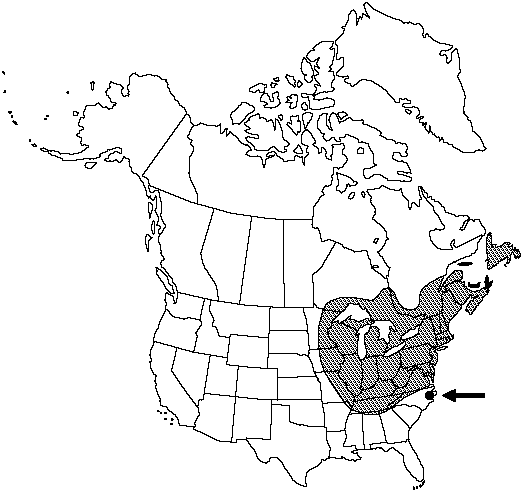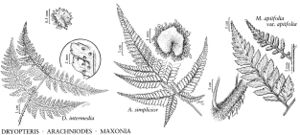Dryopteris intermedia
Manual 630. 1848.
Leaves monomorphic, green through winter, 32–90 × 10–20 cm. Petiole 1/3 length of leaf, scaly at least at base; scales scattered, tan. Blade green, ovate, 3-pinnate-pinnatifid, herbaceous, glandular. Pinnae ± in plane of blade, lanceolate-oblong; basal pinnae lanceolate, not reduced, basal pinnules longer than adjacent pinnules, basal basiscopic pinnule longer than basal acroscopic pinnule; pinnule margins serrate, teeth spiny. Sori midway between midvein and margin of segments. Indusia with minute glandular-hairs. 2n = 82.
Habitat: Moist rocky woods, especially hemlock hardwoods, ravines, and edges of swamps
Elevation: 0–2000 m
Distribution

N.B., Nfld., N.S., Ont., P.E.I., Que., Ala., Conn., Del., Ga., Ill., Ind., Iowa, Ky., Maine, Md., Mass., Mich., Minn., Mo., N.H., N.J., N.Y., N.C., Ohio, Pa., R.I., Tenn., Vt., Va., W.Va., Wis.
Discussion
A related taxon, Dryopteris intermedia subsp. maderensis (J. Milde ex Alston) Fraser-Jenkins, occurs on eastern Atlantic islands.
Dryopteris intermedia and the other taxa in the " D. spinulosa complex" have long confounded taxonomists. Dryopteris intermedia is diploid and is one of the parents of the allotetraploids D. carthusiana and D. campyloptera. Dryopteris intermedia hybridizes with eight species. All hybrids are easily detected by the distinctive glandular hairs on the indusia and, usually, on the costae and costules.
Selected References
None.
